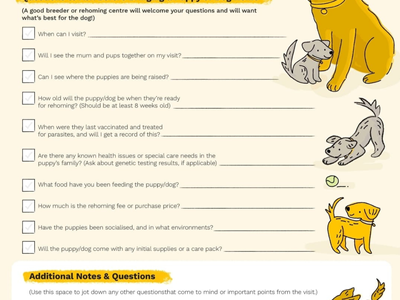
Fetching the Facts
Give yourself and your new family member the best possible start.
Learn about puppy farms & how to spot puppy farm red flags.

Puppy farms are commercial dog breeding facilities that prioritise profit over the welfare of the animals. Dogs in these operations are often kept in cramped, unhygienic conditions with minimal veterinary care and socialisation. Breeding practices in puppy farms frequently lead to serious health issues in the puppies, such as genetic disorders and infectious diseases, while the lack of human interaction can result in significant behavioural problems.
These inhumane conditions not only cause immense suffering for the dogs but also contribute to the broader issues of overpopulation and the abandonment of unhealthy or unmanageable dogs.
This can mean the new owners of puppy farmed puppies and dogs can have a hard time if they bring their dog home with illness and unwanted behaviours. These issues can lead to additional costs to the owner with veterinary and dog trainer expenses, time needed to care for the dog and the emotional toil of seeing your new puppy so unwell. All this stress can result in the owner giving up the dog to local authorities or rescues.
If you notice any of the following, proceed with caution these may be signs of a puppy farm or an unethical breeder:
We’ve created a checklist packed with essential questions and information to help you steer clear of puppy farms, make a responsible choice when getting your new dog or puppy and the important things to watch for during your visit.

Give yourself and your new family member the best possible start.
Trust your instincts. If you are concerned in any way about a breeder or an establishment, you can report them confidentially to the ISPCA, or DSPCA if in Dublin, especially if there are signs of obvious neglect or cruelty. If something feels off and you have bought a puppy from a classified ad or website that has proved to be poorly or have behavioural problems or suspect someone may be operating a puppy farm, don’t hesitate to report it to the the Irish Pet Advertising Advisory Group (IPAAG) Your actions could help prevent other animals from suffering and encourage responsible breeding practices.
Rescued mums and their pups can take a huge amount of commitment, hard work, patience and love to help them turn into happy, healthy and well-rounded dogs. Thanks to our dog loving supporters, we help rescue mums and pups from lives of torment and put their paws on the path to a new life of hope and happiness.
By taking the time to choose a responsible breeder or rehoming facility, you're setting yourself and your future furry friend up for a wonderful journey together. The joy of welcoming a healthy, well-cared-for puppy into your home is unmatched, and the love and companionship you’ll share will be well worth the effort.
Wherever you are on your dog owning journey, Dogs Trust is here to help.
Do you know the doggy dos and the doggy don’ts when it comes to buying a pup? Test your knowledge in our Dogs Trust Pup Quiz!
The Dog Breeding Establishments Act 2013 or the DBE Act as it is more commonly referred to, applies to any establishment/person who has 6 or more female dogs capable of breeding.
In February 2020, laws to crack down on the illegal sale of dogs and pups in Ireland were introduced – and welcomed by Dogs Trust and other animal welfare organisations.
To sell pets, a person must:
The laws also state that it is illegal to sell a puppy less than eight weeks old.
The aim of these laws is to stamp out cruel and illegal dog breeding and improve the health and welfare of dogs being sold and supplied.
It is a LEGAL requirement for the sale or supply of a dog that a microchip certificate accompanies the dog. Please don't ever trust a person who 'will send you on the paperwork in the post'.

Add your voice and help end cruel breeding practices for good